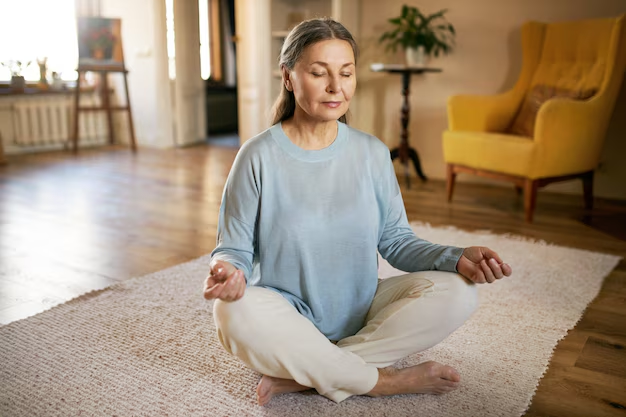As we age, our bodies and minds experience various changes that can affect our overall well-being. While physical health may naturally decline, mental and emotional health are just as important—especially for seniors. One effective way to support both mental and physical wellness as we age is through meditation. Meditation isn’t just for young, stressed-out professionals or spiritual seekers; it offers unique and powerful meditation benefits for seniors, too. In this article, we’ll explore the meditation benefits for seniors and why it’s never too late to start.
Why Meditation Matters for Seniors?
Meditation involves mindfulness practices, deep breathing, and relaxation techniques that help calm the mind and promote overall well-being. As seniors face different life challenges such as retirement, physical limitations, and emotional transitions, meditation provides an accessible and effective way to improve their quality of life. With its ability to reduce stress, improve mental clarity, and enhance emotional balance, meditation is a holistic practice that promotes better aging.
Meditation Benefits for Seniors:
See below the Meditation Benefits for Seniors…
Improves Cognitive Health and Memory:
One of the most significant concerns for seniors is the potential decline in cognitive abilities, such as memory, focus, and decision-making. Meditation can help maintain mental sharpness and slow the progression of cognitive decline. Mindfulness meditation, in particular, improves attention, memory retention, and cognitive flexibility.
Meditation has been shown to increase grey matter density in the brain, particularly in areas responsible for memory, learning, and emotional regulation. This can help seniors stay mentally active and reduce the risk of conditions like dementia and Alzheimer’s disease.
Reduces Stress and Anxiety:
Stress and anxiety levels often increase with age due to various life changes, including the loss of loved ones, financial concerns, or health challenges. Meditation is a powerful tool to manage stress and alleviate anxiety.
Meditation helps activate the body’s relaxation response, lowering levels of cortisol (the stress hormone). It encourages deep breathing and mindfulness, which relaxes the nervous system and helps seniors approach life’s challenges with a calm and clear mind.
Improves Sleep Quality:
Sleep problems, such as insomnia or frequent waking during the night, are common among seniors. Meditation can promote better sleep quality by calming the mind and reducing restlessness before bedtime.
Practices like deep breathing, body scanning, and guided imagery help ease the body into a relaxed state, making it easier to fall asleep and stay asleep. Regular meditation can improve sleep duration and quality, leading to better physical and mental health.
Boosts Emotional Well-being:
Aging can bring about emotional challenges like loneliness, depression, and feelings of isolation. Meditation can boost emotional health by fostering a sense of connection, peace, and acceptance.
Mindfulness meditation encourages seniors to be present with their emotions without judgment, which helps them process feelings of sadness or grief. Practices like loving-kindness meditation also promote compassion, both for oneself and others, helping seniors build emotional resilience.
Enhances Physical Health and Pain Management:
Chronic pain, arthritis, and other age-related physical ailments are common as we age. Meditation can offer relief by reducing the perception of pain and promoting overall physical relaxation.
Meditation techniques such as body scanning and progressive muscle relaxation help seniors relax tense muscles, reduce inflammation, and manage pain. Additionally, mindfulness meditation has been shown to reduce the brain’s sensitivity to pain, making it easier for seniors to manage discomfort.
Improves Balance and Physical Coordination:
Physical stability and coordination naturally decline with age, making seniors more prone to falls and injuries. Meditation, particularly mindfulness-based practices, can help improve balance and coordination by increasing body awareness.
Practices like yoga and tai chi, which incorporate meditation, improve posture, flexibility, and strength. Mindfulness meditation also enhances proprioception, the body’s ability to sense its position in space, which can help seniors maintain better physical balance.
Promotes Better Relationships and Social Connections:
As seniors age, they may experience social isolation, which can lead to feelings of loneliness and depression. Meditation, especially practices like loving-kindness meditation, can help improve interpersonal relationships.
Loving-kindness meditation encourages seniors to cultivate feelings of compassion and empathy, not only toward themselves but also toward others. This can improve interactions with loved ones and help seniors form deeper, more meaningful social connections.
Supports Healthy Aging:
Meditation can play a role in healthy aging by reducing inflammation, improving immune function, and boosting overall vitality. Regular meditation has been shown to lower markers of inflammation, which are associated with various age-related diseases. It can also strengthen the immune system, helping seniors stay healthier for longer. The mental clarity and sense of purpose that come with meditation also encourage seniors to stay more active and engaged in life.
How Seniors Can Get Started with Meditation:
Start Slow: If you’re new to meditation, begin with short sessions of 5-10 minutes, gradually increasing the time as you become more comfortable. It’s essential not to overwhelm yourself, especially when you’re starting.
Find a Comfortable Position: You don’t need to sit cross-legged on the floor. Meditation can be done while seated in a comfortable chair or lying down. The key is to find a position that allows you to relax without discomfort.
Use Guided Meditation: If you’re unsure how to meditate, guided meditation apps or videos can be helpful. These provide step-by-step instructions and soothing voices to guide you through the practice.
Focus on Breathing: Deep breathing is one of the simplest and most effective meditation techniques. Focus on your breath as you inhale and exhale, trying to clear your mind of distractions.
Be Consistent: Like any new habit, meditation requires consistency. Aim for daily practice, even if it’s just for a few minutes, to see the long-term benefits.
Conclusion:
Meditation is a powerful tool that can significantly enhance the quality of life for seniors. Whether you’re seeking to manage stress, improve cognitive health, manage pain, or simply find peace of mind, meditation offers a wealth of benefits for older adults. The beauty of meditation lies in its simplicity, accessibility, and adaptability to each individual’s needs. By incorporating meditation into your daily routine, you can foster greater mental clarity, emotional balance, and overall physical wellness—leading to a healthier, more fulfilling life as you age.





